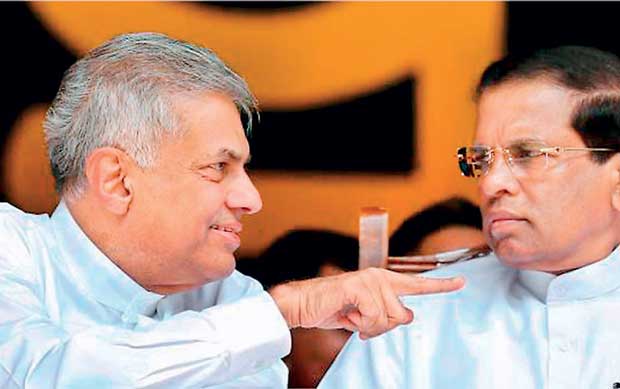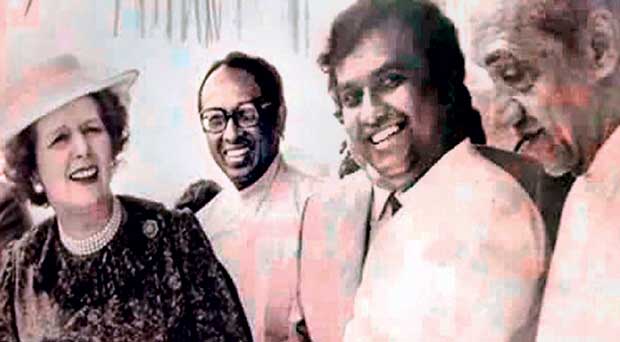23 Aug 2016 - {{hitsCtrl.values.hits}}


The first year anniversary celebrations of the good governance government will be held at the Sanath Jayasuriya grounds in Matara, recently.
President Maithripala Sirisena and Prime Minister Ranil Wickremesinghe presided at the event titled ‘New Country, One Journey’. A colorful display of the national government’s achievements for the country and the people in the past year was the highlight of the one year celebrations.
While the government celebrates their achievements, it may be useful to reflect on the results of the recently concluded survey and take stock of the current situation.
Two weeks ago, participants at the Sri Lanka Economic Summit in a survey had been lukewarm of the progress made so far by the government and had mixed views about the Budget of the government.
Captains of industry had in effect showed a lot of pessimism towards government policies. The government could however argue that it needs more time, but whatever is said about the private sector captains that they are selfish and profit seeking, private sector investment is critical to achieve economic progress.
The government needs to therefore encourage entrepreneurial zeal and provide adequate support to investors. So the government needs to focus on policies that can best ensure that private businesses are willing and able to invest. Not necessarily the conventional wisdom of the World Bank’s Ease of Doing Business indicators. This says that clear rules and a level playing field encourage investment — but the results of implementing policy based on these criteria have been ambiguous.

Ranil and Maithri
President Sirisena with the support of Ranil Wickremesinghe’s UNP, the country’s largest political party, won the election on the promise of “Yahapalanaya” or good governance on the 8th of January 2015. Mahinda Rajapakse was sent home for several reasons, both political and economic.
Fortunately, he called for early elections, thereby being sent home packing two years early.
The country was heading straight for disaster, in torment within, colliding against the West and sinking in debt. Among the reasons Mahinda lost was that he had alienated the minorities of this country with his Sinhala-Buddhist chauvinism. The minorities led by the Tamils and Muslims now comprise well over a quarter of the island’s population. And when the Sinhala Christian population is added on, the total is close to 30 percent of Sri Lanka’s population. MR’s failed game plan hinged on trying to get that simple majority (50 percent+1 vote) for him to stay in power, from the country’s 70 percent Sinhala-Buddhist vote. In this strategy, the so called “coup de grace» was his win over the LTTE with which the country fought a bloody and destructive war spanning over a period of nearly three decades of which victory came to pass after 4 years into MR’s first term, on May 19th, 2009.
That victory will and cannot be forgotten. When history is written, given the short memories we Sri Lankans have. Mahinda Rajapakse will certainly be idolized for defeating the ruthless LTTE. That war win brought him a resounding victory when he called a snap presidential poll eight months later in January 2010, but five years down the line, that steam had run out of power, with the electorate handing him defeat at the January 8th, 2015 Presidential poll.
Need for greater visibility
Twenty months have passed since Maithri’s election. During this period a lot has been achieved on the political front, however on the economic front, foreign direct investments (FDI) or public investments, or a mix of both has been very disappointing. FDI has been revolving round a pathetic one percent of GDP despite the war ending more than six years ago, with seemingly not much of a change despite the regime change 20 months ago, public investments however have fallen.
Latest Central Bank of Sri Lanka (CBSL) statistics showed that capital & lending expenditure minus repayments in the first half (1H) of the current year had had declined. On the other hand current (consumption) expenditure had zoomed, while revenue has lagged behind, not sufficient to even meet the state’s total current account bill, leave alone its capital account bill. It is said that one reason why RaniI Wickremesingha lost the April 2004General Election was because unlike his uncle President J R Jayewardene (Junius Richard Jayewardene famously abbreviated as JR, served as Prime Minister for half a year before becoming the country’s first executive president under an amended constitution), he was unable to launch a massive infrastructure development project like the Accelerated Mahaweli Development scheme, which provided employment to thousands
JR’s “A team”: Ronnie, Gamini and Athulathmudali
It was possible for Jayewardene to implement the Accelerated Mahaweli because of the grant aid he got from the West and at the very worst, concessional aid (as opposed to foreign commercial loans) from First World countries, JR, the far sighted man that he was, won the gratitude of Japan with his famous speech at the San Francisco Peace Conference of 1951, where he appealed to universal religious values in the Buddhist idiom, pleading non hatred and mercy for defeated Japan, in the context that the then Soviet Union together with its satellite Warsaw Pact countries and aggrieved Asian countries were demanding war reparations.
Japan never forgot that favour extended to them by JR and when JR won the 1977 general election, Japan, by then an economic powerhouse and the second largest economy in the world, poured in aid to Sri Lanka, in the form of infrastructure development assistance. JR, as a young minister of Sri Lanka’s first Cabinet of 1947 was also an admirer of the USA in particular and the West in general, of their democratic institutions and in the US case, its free market economy which he implemented no sooner he was elected to power. JR, from the beginning had seemingly played all the right cards, though that phrase may be unkind to describe him, because those were the things he believed from his heart and were not premeditated nor executed with any ulterior motives.
Thus, when he became the head of state, the world that matters, i.e. the developed world was fully supportive of him. JR said that his first priority was jobs, his second priority was jobs and his third priority was also jobs. At the time of his election, Sri Lanka’s unemployment was virtually at the double- digit range. He knew that it was only through the opening up of the economy, inviting foreign investments and embarking on massive infrastructure projects like the Mahaweli with foreign aid (as Sri Lanka lacked the capital), could the country’s unemployment rate be reduced. And he did just that.Ranil too enjoys that goodwill, particularly stemming from Japan, because of his uncle. He’s also looked upon favourably by the West. It’s up to him to leverage on those advantages in order to kick start the economy. To say that Japan and the West unlike in 1977 don’t have the money may be a fallacy. Even during the time JR was elected, the West was in recession, made worse by the Iranian crisis after the Shah was toppled, followed by the Iran- Iraqi war which sent oil prices soaring. But those mishaps didn’t stop the West and Japan from providing economic aid to JR’s
Sri Lanka.
It may be argued that as Sri Lanka has now graduated to a lower middle income country, it doesn’t qualify itself for any bilateral or multilateral assistance. But then look at a country like Greece, classified as a high income country by the World Bank (as opposed to Sri Lanka being classified as a low middle income country), it’s still getting billions of dollars worth of aid from the IMF, the European Union and the European Central Bank to bail out its economy.
Way forward
The Maithri -Ranil government at the start distanced itself from China, a country that Sri Lanka under the Rajapaksas had cozied up to, to the chagrin of the West, Japan and India. The new regime post Rajapaksa whilst building up on the premise of reconciliation and Political freedom has got very little in return from its friends, the West and Japan. International jurists to sit in as observers over Colombo on alleged war crimes committed by it in its war against LTTE terrorism. No restitution of GSP Plus at least up to now, no funding for infrastructure development programme and no balance of payments support.
One of the first things that the new regime did after it was elected to power was to suspend the Chinese funded US$ 1.5 billion plus Colombo Port City Project. The renegotiation with China over Port City was necessary. Sovereign rights to perpetual ownership, sea rights and airspace had been bartered away on a platter. This was unacceptable. But there was no need for all the bashing. China has been a friend and stood by us in our time of need, so has Japan, the West and India. No tangible benefits have yet been forthcoming for the real economy, whatever was given by way of price reductions last year is now forgotten .
This is the time for our friends to stand up and be counted. There are also things that Ranil and Maithri will have to put right. Be charming and forceful like JR when dealing with one’s friends to ensure that the economy gets what it needs. Go beyond JR to the realm of moral power (just and righteous society) to “Yahapalanaya” (good governance), which became the winning factor at the 2015 January election.
Be strong like Lee Kuan Yew against corruption, conflict of interests, employing friends and nepotism, which even JR failed to subdue, if not now, later, but sooner rather than never.
Sri Lanka needs a good team in place, another “Ronnie de Mel, Ranasinghe Premadasa, Lalith Athulathmudali, Gamini Dissanayake, Ranil Wickramasinge” combination, not infighting and disunity. A house divided is bound to fall. Build the house on a firm foundation of good governance. Ranil- Maithri can certainly deliver on that promise of good governance and economic prosperity, but they certainly need to work much smarter and also assemble a solid team to get there.
(The writer is a thought leader)
10 Jan 2025 1 hours ago
10 Jan 2025 1 hours ago
10 Jan 2025 2 hours ago
10 Jan 2025 3 hours ago
10 Jan 2025 3 hours ago